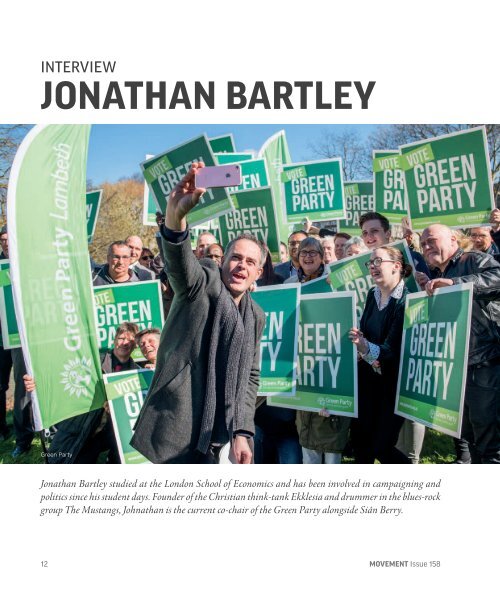Movement_158_Digital
You also want an ePaper? Increase the reach of your titles
YUMPU automatically turns print PDFs into web optimized ePapers that Google loves.
INTERVIEW<br />
JONATHAN BARTLEY<br />
Green Party<br />
Jonathan Bartley studied at the London School of Economics and has been involved in campaigning and<br />
politics since his student days. Founder of the Christian think-tank Ekklesia and drummer in the blues-rock<br />
group The Mustangs, Johnathan is the current co-chair of the Green Party alongside Siân Berry.<br />
Firstly, can you tell us a little about yourself? How<br />
would you describe your faith journey?<br />
I grew up in quite an evangelical, charismatic Christian<br />
family, but, like a lot of people I think, I questioned the<br />
faith that I grew up with a lot. Things like Greenbelt were<br />
very important to me, and I used to go quite a lot when I<br />
was younger. I’m descended from Elizabeth Fry who was<br />
a Quaker and Prison Reformer, so that strand comes down<br />
through the family too.<br />
While I was studying at the London School of Economics I<br />
found something called Workshop, an Anabaptist course run<br />
by Noel Moules. For anyone not familiar with Anabaptism,<br />
it’s very committed to equality and social justice, and has<br />
a similar background tradition to Quakerism. Workshop<br />
opened up a whole new world to me in terms of faith. The<br />
things that I wanted to believe made sense, and it gave me<br />
a rationale to believe them. For example, I’m passionately<br />
a proponent of non-violence and Workshop enabled me to<br />
see that within my faith which was amazing.<br />
For me, joining the Green Party is very much an outworking<br />
of my faith. Of course, you don’t have to be Christian to<br />
be in the Green Party, and there are Christians in other<br />
parties too. I’ve realised that there are many different<br />
types of Christianity, and there are different value sets<br />
that people hold as Christians. It’s astonishing that you<br />
can find Christians on both sides of some debates and I<br />
find that really strange, because when I look at Christianity<br />
it’s as much about how you live, in fact more about how<br />
you live, than the doctrines that we hold dear. When we<br />
look at the early church and early Christians, and the<br />
Epistle to Diognetus in the second century, when they are<br />
asked ‘What is a Christian?’, they don’t respond with a<br />
set of beliefs and doctrines, they respond with a set of<br />
behaviours and describe themselves as following ‘the<br />
way’. In the Acts of the Apostles, after the spontaneous<br />
outpouring of the Holy Spirit at Pentecost, the response is<br />
one of collectivising, pooling all they have and giving it to<br />
the poor. And so that is the faith tradition that I find myself<br />
in and following really.<br />
You’ve said before that your faith informs your<br />
politics. Do you think that there is an overlap between<br />
the message of Jesus and the aims of progressive<br />
politics?<br />
Yes I think there is. Ghandi, and I’m paraphrasing him<br />
terribly here, said that Christians would be great if they just<br />
followed what Jesus said. Martin Luther King was someone<br />
who did that in his nonviolent direct action. There is a very<br />
strong strand of nonviolent direct action in my faith that I<br />
feel a great affinity with.<br />
In 2003 I wrote a book called The Subversive Manifesto:<br />
Lifting the Lid on God’s Political Agenda, which looked at<br />
the way Jesus took part in nonviolent direct action. Look at<br />
his interplay at the Synagogue at Capernaum where he has<br />
that interaction with a demon - Ched Myers is very good<br />
on this, and he points out that Jesus is calling into question<br />
the authority of the religious and political leaders of the<br />
day, and the Gospel writers notice that he had an authority<br />
that the scribes didn’t have, so this demon manifests and<br />
belittles Jesus and tries to reclaim the authority by saying<br />
‘I know who you are Jesus of Nazareth’. And we know that<br />
it is an attempt to undermine Jesus, but Jesus regains the<br />
authority. And again when he looks closely at both sides of<br />
the coin and answers the question about taxation. There’s<br />
this very strong political strand that runs right the way<br />
though the Gospels, and you can only understand Jesus<br />
as a political figure. When he’s tempted in the desert there<br />
are three temptations to take power, and to bring about a<br />
top-down revolution, and Jesus rejects all three of them.<br />
I wrote another book, Faith and Politics After Christendom:<br />
the Church as a <strong>Movement</strong> for Anarchy, which traces the<br />
idea of Christians being passionate about social justice<br />
and living ‘the way’ being annexed by political power<br />
by Constantine in the 4th Century. The cross, which<br />
was a symbol of torture and oppression, became under<br />
Constantine a symbol of conquest and righteousness.<br />
And now 1700 years later Christianity takes its place as<br />
an oppressive force within western Europe, and actually<br />
persecutes Christians who don’t see things in the same<br />
way as the church.<br />
12 MOVEMENT Issue <strong>158</strong> MOVEMENT Issue <strong>158</strong><br />
13

















